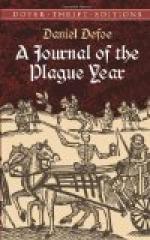[52] So called because many Frenchmen lived there. In Westminster there was another district with this same name.
[53] “Gave them vapors,” i.e., put them into a state of nervous excitement.
[54] Soothsayers.
[55] In astrology, the scheme or figure of the heavens at the moment of a person’s birth. From this the astrologers pretended to foretell a man’s destiny.
[56] Roger Bacon, a Franciscan friar of the thirteenth century, had a knowledge of mechanics and optics far in advance of his age: hence he was commonly regarded as a wizard. The brazen head which he manufactured was supposed to assist him in his necromantic feats; it is so introduced by Greene in his play of Friar Bacon and Friar Bungay (1594).
[57] A fortune teller who lived in the reign of Henry VIII., and was famous for her prophecies.
[58] The most celebrated magician of mediaeval times (see Spenser’s Faerie Queene and Tennyson’s Merlin and Vivien).
[59] Linen collar or ruff.
[60] Him.
[61] The interlude was originally a short, humorous play acted in the midst of a morality play to relieve the tedium of that very tedious performance. From the interlude was developed farce; and from farce, comedy.
[62] Charles II. and his courtiers, from their long exile in France, brought back to England with them French fashions in literature and in art.
[63] To be acted.
[64] Buffoons, clowns.
[65] About 621/2 cents.
[66] About twenty-five dollars; but the purchasing power of money was then seven or eight times what it is now.
[67] Strictly speaking, this word means “love potions.”
[68] Exorcism is the act of expelling evil spirits, or the formula used in the act. Defoe’s use of the word here is careless and inaccurate.
[69] Bits of metal, parchment, etc., worn as charms.
[70] Making the sign of the cross.
[71] Paper on which were marked the signs of the zodiac,—a superstition from astrology.
[72] A meaningless word used in incantations. Originally the name of a Syrian deity.
[73] Iesus Hominum Salvator ("Jesus, Savior of Men"). The order of the Jesuits was founded by Ignatius de Loyola in 1534.
[74] The Feast of St. Michael, Sept. 29.
[75] This use of “to” for “of” is frequent with Defoe.
[76] The Royal College of Physicians was founded by Thomas Linacre, physician to Henry VIII. Nearly every London physician of prominence is a member.
[77] The city of London proper lies entirely in the county of Middlesex.
[78] Literally, “hand workers;” now contracted into “surgeons.”
[79] Cares, duties.
[80] Consenting knowledge.
[81] Disposed of to the public, put in circulation.
[82] That is, by the disease.
[83] Happen.




